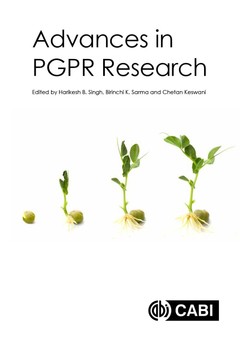Advances in PGPR Research
Langue : Anglais
Auteur : SINGH Harikesh Bahadur

Rhizosphere biology is approaching a century of investigations wherein
growth-promoting rhizomicroorganisms (PGPR) have attracted special
attention for their ability to enhance productivity, profitability and
sustainability at a time when food security and rural livelihood are a key
priority. Bio-inputs - either directly in the form of microbes or their
by-products - are gaining tremendous momentum and harnessing the potential
of agriculturally important microorganisms could help in providing
low-cost and environmentally safe technologies to farmers.One approach to
such biologically-based strategies is the use of naturally occurring
products such as PGPR.
Advances in PGPR Research explores recent developments and global issues in biopesticide research, presented via extended case studies and up-to-date coverage of:
· Low input biofertilizers and biofungicides used for sustainable agriculture.
· Molecular techniques to enhance efficacy of microbial inputs.
· Intellectual property issues in PGPR research.
Written by an international team of experts, this book considers new concepts and global issues in biopesticide research and evaluates the implications for sustainable productivity. It is an invaluable resource for researchers in applied agricultural biotechnology, microbiology and soil science, and also for industry personnel in these areas.
Advances in PGPR Research explores recent developments and global issues in biopesticide research, presented via extended case studies and up-to-date coverage of:
· Low input biofertilizers and biofungicides used for sustainable agriculture.
· Molecular techniques to enhance efficacy of microbial inputs.
· Intellectual property issues in PGPR research.
Written by an international team of experts, this book considers new concepts and global issues in biopesticide research and evaluates the implications for sustainable productivity. It is an invaluable resource for researchers in applied agricultural biotechnology, microbiology and soil science, and also for industry personnel in these areas.
- 1: Mechanisms of Growth Promotion by Members of the Rhizosphere Fungal
Genus Trichoderma
- 2: Physiological and Molecular Mechanisms of Bacterial Phytostimulation
- 3: Real-time PCR as a Tool towards Understanding Microbial Community Dynamics in Rhizosphere
- 4: Biosafety Evaluation: A Necessary Process Ensuring the Equitable Beneficial Effects of PGPR
- 5: Role of Plant Growth Promoting Microorganisms in Sustainable Agriculture and Environmental Remediation
- 6: Pseudomonas Communities in Soil Agroecosystems
- 7: Management of Soilborne Plant Pathogens with Beneficial Root-Colonizing Pseudomonas
- 8: Rhizosphere, Mycorrhizosphere and Hyphosphere as Unique Niches for Soil-Inhabiting Bacteria and Micromycetes
- 9: The Rhizospheres of Arid and Semiarid Ecosystems are a Source of Microorganisms with Growth-Promoting Potential
- 10: Rhizosphere Colonization by Plant-Beneficial Pseudomonas spp.: Thriving in a Heterogeneous and Challenging Environment
- 11: Endophytomicrobiont: A Multifaceted Beneficial Interaction
- 12: Contribution of Plant Growth Promoting Bacteria to the Maize Yield
- 13: The potential of Mycorrhiza Helper Bacteria as PGPR
- 14: Methods for Evaluating Plant Growth Promoting Rhizobacteria Traits
- 15: The Rhizosphere Microbial Community and Methods of its Analysis
- 16: Improving Crop Performance under Heat Stress using Thermo tolerant Agriculturally Important Microorganisms
- 17: Phytoremediation and the Key Role of PGPR
- 18: Role of Plant Growth Promoting Rhizobacteria (PGPR) in Degradation of Xenobiotic Compounds and Allelochemicals
- 19: Bio-priming and their Metabolic Engineering for Growth and Development of Crop Species in Context of Changing Stress -A Review
- 20: Unravelling the Dual Applications of Trichoderma spp. as Biopesticide and Biofertilizer
- 21: Genome insights into Plant Growth-Promoting Rhizobacteria, an Important Component of Rhizosphere Microbiome
- 22: Plant Growth Promoting Rhizobacteria (PGPR): Mechanism, Role in Crop Improvements and Sustainable Agriculture
- 23: PGPR: A Good Step to Control Several of Plant Pathogens
- 24: Role of Trichoderma Secondary Metabolites in Plant Growth Promotion and Biological Control
- 25: PGPR Mediated Defence Activation in Plant under Biotic and Abiotic Stress
- 2: Physiological and Molecular Mechanisms of Bacterial Phytostimulation
- 3: Real-time PCR as a Tool towards Understanding Microbial Community Dynamics in Rhizosphere
- 4: Biosafety Evaluation: A Necessary Process Ensuring the Equitable Beneficial Effects of PGPR
- 5: Role of Plant Growth Promoting Microorganisms in Sustainable Agriculture and Environmental Remediation
- 6: Pseudomonas Communities in Soil Agroecosystems
- 7: Management of Soilborne Plant Pathogens with Beneficial Root-Colonizing Pseudomonas
- 8: Rhizosphere, Mycorrhizosphere and Hyphosphere as Unique Niches for Soil-Inhabiting Bacteria and Micromycetes
- 9: The Rhizospheres of Arid and Semiarid Ecosystems are a Source of Microorganisms with Growth-Promoting Potential
- 10: Rhizosphere Colonization by Plant-Beneficial Pseudomonas spp.: Thriving in a Heterogeneous and Challenging Environment
- 11: Endophytomicrobiont: A Multifaceted Beneficial Interaction
- 12: Contribution of Plant Growth Promoting Bacteria to the Maize Yield
- 13: The potential of Mycorrhiza Helper Bacteria as PGPR
- 14: Methods for Evaluating Plant Growth Promoting Rhizobacteria Traits
- 15: The Rhizosphere Microbial Community and Methods of its Analysis
- 16: Improving Crop Performance under Heat Stress using Thermo tolerant Agriculturally Important Microorganisms
- 17: Phytoremediation and the Key Role of PGPR
- 18: Role of Plant Growth Promoting Rhizobacteria (PGPR) in Degradation of Xenobiotic Compounds and Allelochemicals
- 19: Bio-priming and their Metabolic Engineering for Growth and Development of Crop Species in Context of Changing Stress -A Review
- 20: Unravelling the Dual Applications of Trichoderma spp. as Biopesticide and Biofertilizer
- 21: Genome insights into Plant Growth-Promoting Rhizobacteria, an Important Component of Rhizosphere Microbiome
- 22: Plant Growth Promoting Rhizobacteria (PGPR): Mechanism, Role in Crop Improvements and Sustainable Agriculture
- 23: PGPR: A Good Step to Control Several of Plant Pathogens
- 24: Role of Trichoderma Secondary Metabolites in Plant Growth Promotion and Biological Control
- 25: PGPR Mediated Defence Activation in Plant under Biotic and Abiotic Stress
Suitable for researchers in applied agricultural biotechnology,
microbiology and soil science.
Bahadur Singh - Professor Singh is Head of the Department of Mycology and Plant Pathology, Institute of Agricultural Sciences, Banaras Hindu University.
Date de parution : 09-2017
Ouvrage de 408 p.
Disponible chez l'éditeur (délai d'approvisionnement : 13 jours).
Prix indicatif 186,63 €
Ajouter au panierThèmes d’Advances in PGPR Research :
© 2024 LAVOISIER S.A.S.



